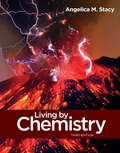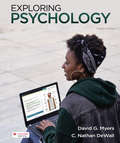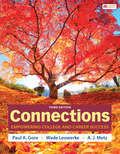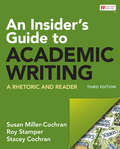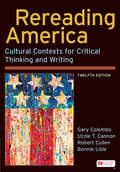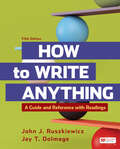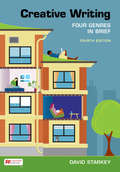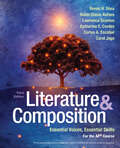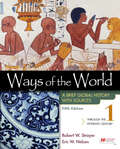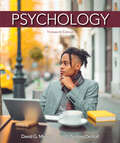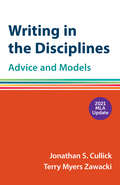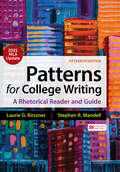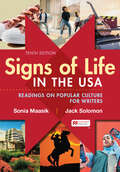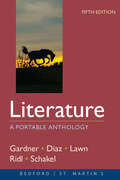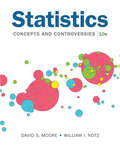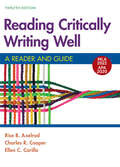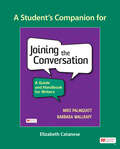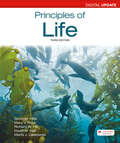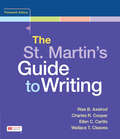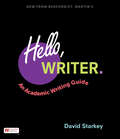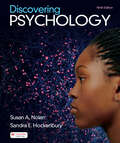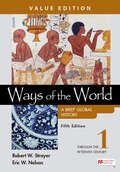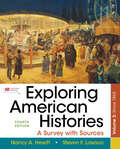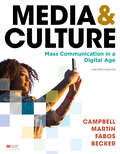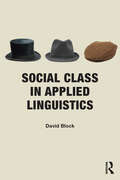Special Collections
Benetech’s Global Certified Accessible Titles
Description: Benetech’s GCA program is the first independent third-party EPUB certification to verify ebook accessibility. By creating content that is born accessible, publishers can meet the needs of all readers. Learn more: https://bornaccessible.benetech.org/
- Table View
- List View
Living by Chemistry
by Angelica StacyLiving By Chemistry is a full-year high school curriculum that incorporates science practices with a guided-inquiry approach. By encouraging students to ask questions and teaching them to collect evidence, students learn how to think like scientists. The new 3rd edition provides topical and necessary focuses on earth science, sustainability, and NGSS-style problem solving.
Exploring Psychology
by David G. Myers and C. Nathan DeWallIn this brief text, Myers and DeWall help you look at the world from the perspective of a psychological scientist, relating psychology ideas and applications to your own thoughts, feelings, and behavior.
Connections
by Paul A. Gore and Wade Leuwerke and A. J. MetzWritten by counseling psychologists Paul Gore, Wade Leuwerke, and A.J. Metz, Connections shows students from day one how to develop the mindset, drive, and strengths needed on their way to college, personal, and career success. The expertly designed program is firmly rooted in current research in positive psychology, using self-reflection as a tool for goal-setting; goal-setting as a tool for imagining one's potential; and imagining one's potential as the motivation for realizing it. Connections puts students at the center of their own personalized learning path, facilitates their purposeful choice of an academic and career plan, and develops all the skills they need--cognitive and non-cognitive, academic and life--to foster their self-growth and success.The thoroughly updated new edition addresses current challenges and research, including the growth of online learning (Appendix: Online Learning), diversity and inclusion (revised Chapter 11: Social Belonging), and the science of learning (revised Chapter 5: Understanding Thinking and Learning). These updates are reflected in a new version of ACES—the powerful, state-of-the-art student self-assessment the authors revised concurrently with Connections.
An Insider's Guide to Academic Writing
by Susan Miller-Cochran and Roy Stamper and Stacey CochranAn Insider’s Guide to Academic Writing prepares students for writing in the humanities, social sciences, natural sciences, and applied fields. It also features a built-in thematic reader that introduces students to the kinds of scholarly reading they will encounter in their courses.
Rereading America
by Robert Cullen and Gary Colombo and Bonnie Lisle and Uzzie T. CannonExamine the assumptions of American culture with a critical lensWith Rereading America’s focus on revisiting, defending, and challenging assumptions about American culture (such as “U.S. laws provide equal protection and justice for all”), you’ll grow as a critical thinker and writer.
How to Write Anything with Readings
by John Ruszkiewicz and Jay DolmageHow to Write Anything supports students with practical advice for all kinds of writing. The easy-to-follow rhetorical sequence, generous examples, and accessible tone empower students to write in any genre, both in class and in the workplace.
Creative Writing
by David StarkeyCreative Writing: Four Genres in Brief offers concise, accessible instruction in the basics of writing poetry, fiction, creative nonfiction, and drama, providing short models of literature to analyze and emulate, plus inventive assignments to inspire and motivate you.
Literature & Composition
by Lawrence Scanlon and Carol Jago and Robin Aufses and Renee Shea and Carlos Escobar and Katherine CordesSince its first edition, Literature & Composition was designed specifically for the AP® English Literature course. Its unique structure of skill-building opening chapters combined with an engaging thematic anthology provides the flexibility you need to plan your year and differentiate based on your students’ needs. In this edition, the book you know and love now fully aligns to the new AP® Course and Exam Description.
Ways of the World with Sources, Volume 1
by Robert Strayer and Eric NelsonWays of the World is a world history textbook with a built-in reader that offers a truly global approach that explores broad patterns and nurtures students’ skill development.
Psychology
by David Myers and C. Nathan DeWallFrom its beginnings to this remarkably fresh and current new edition, Myers and DeWall’s Psychology has found extraordinarily effective ways to involve students with the remarkable research underlying our understanding of human behavior. But while the content and learning support evolves edition after edition, the text itself continues to be shaped by basic goals David Myers established at the outset, including to connect students to high-impact research, to focus on developing critical thinking skills, and to present a multicultural perspective on psychology, so students can see themselves in the context of a wider world.This new edition offers 2100 research citations dated 2015–2020, making these the most up-to-date introductory psychology course resources available. With so many exciting new findings, and every chapter updated with current new examples and ideas, students will see the importance and value of psychological research, and how psychology can help them make sense of the world around them. The abundant, high quality teaching and learning resources in LaunchPad and in Achieve Read & Practice, carefully matched to the text content, help students succeed, while making life easier and more enjoyable for instructors.
Writing in the Disciplines with 2021 MLA Update
by Diana Hacker and Nancy Sommers and Jonathan S. Cullick and Terry Myers ZawackiThis ebook has been updated to provide you with the latest guidance on documenting sources in MLA style and follows the guidelines set forth in the MLA Handbook, 9th edition (April 2021).With practical advice and plenty of student models, Writing in the Disciplines provides a jump start for writing college papers in nine disciplines — biology, business, criminal justice/criminology, education, engineering, history, music, nursing, and psychology. Each discipline section features information on audience expectations in that area of study, the types of questions asked, the types of documents produced, the kinds of evidence used, appropriate language conventions, and appropriate citation styles. Each section features a model student paper (two in business) written in response to a typical assignment in the discipline. Advice for writing in business, criminal justice, education, nursing, and psychology includes updated APA guidelines (2020).
Patterns for College Writing with 2021 MLA Update
by Laurie G. Kirszner and Stephen MandellThis ebook has been updated to provide you with the latest guidance on documenting sources in MLA style and follows the guidelines set forth in the MLA Handbook, 9th edition (April 2021).Patterns for College Writing provides instruction, visual texts, diverse essays, and student writing examples to help you develop your writing skills using rhetorical patterns like narration, description, argumentation, and more.
Signs of Life in the USA
by Sonia Maasik and Jack SolomonSigns of Life in the USA helps you learn the practice of writing critically about pop culture--from tv and movies to music and social media--and have a bit of fun in the process. The authors provide both the framework and the language necessary to analyze our shared cultural experiences.
Literature
by Jack Ridl and Peter Schakel and Janet E. Gardner and Beverly Lawn and Joanne DiazLiterature: A Portable Anthology features nearly 250 literary selections with thorough coverage of reading and writing about literature, all at an affordable price.
Statistics
by David Moore and William NotzThere are books on statistical theory and books on statistical methods. This is neither. It is a book on statistical ideas and statistical reasoning and on their relevance to public policy and to the human sciences from medicine to sociology. We have included many elementary graphical and numerical techniques to give flesh to the ideas and muscle to the reasoning. Students learn to think about data by working with data. We have not, however, allowed technique to dominate concepts. Our intention is to teach verbally rather than algebraically, to invite discussion and even argument rather than mere computation, though some computation remains essential. The coverage is considerably broader than one might traditionally cover in a one-term course, as the table of contents reveals. In the spirit of general education, we have preferred breadth to detail. Despite its informal nature, SCC is a textbook. It is organized for systematic study and has abundant exercises, many of which ask students to offer a discussion or make a judgment. Even those admirable individuals who seek pleasure in uncompelled reading should look at the exercises as well as the text. Teachers should be aware that the book is more serious than its low mathematical level suggests. The emphasis on ideas and reasoning asks more of the reader than many recipe-laden methods texts. For the first time, SCC will publish with SaplingPlus as it’s full course digital solution. We’ll have a well developed library of both error specific feedback and generic feedback tutorial assessment, aligned to the main learning goals of the chapter and largely taken directly from the end-of-chapter exercises in the book. SaplingPlus will also host our robust suite of teaching and learning resources: Concept and Controversy videos, statistical applets, Learning Curve, data sets, and many more teaching and learning focused tools.
Reading Critically, Writing Well with 2020 APA and 2021 MLA Updates
by Rise B. Axelrod and Charles R. Cooper and Ellen CarilloThis ebook has been updated to provide you with the latest guidance on documenting sources in MLA style and follows the guidelines set forth in the MLA Handbook, 9th edition (April 2021).Reading Critically, Writing Well is a diverse collection of readings from established, emerging, and student writers, combined with expert support for writing across genres. The readings aim to inspire engaged reading, spark curious conversations, and provoke thoughtful writing. Reading Critically, Writing Well provides both the readings and the support you need to make effective rhetorical choices in your own writing.
A Student's Companion to Joining the Conversation
by Mike Palmquist and Barbara Wallraff and Elizabeth CataneseThe Student’s Companion supports students taking a co-requisite or ALP course alongside first-year composition. This workbook includes college success strategies; activities to help students develop their writing; and additional practice in correcting writing problems.
Principles of Life Digital Update
by David Hillis and David Hall and Richard Hill and Mary Price and Marta Laskowski and Lauren O'ConnellPOL helps you build the skills and understanding you’ll need to succeed in the intro biology course, and give you a solid foundation for subsequent science courses as well. This version of the text is matched up with Macmillan Learning’s breakthrough online platform, Achieve.
The St. Martin's Guide to Writing
by Rise B. Axelrod and Charles R. Cooper and Wallace Cleaves and Ellen CarilloThe comprehensive resource for helping students succeed in the full variety of assignments they’ll face in first-year writing courses.
Hello, Writer.
by David StarkeyHello, Writer: An Academic Writing Guide, developed for the first-year composition course with corequisite support, combines familiar academic writing and reading topics with a fresh and flexible approach that works in multiple teaching and learning contexts and with a range of college writers. Support for common first-year writing assignments—such as analyzing a text, arguing a position, and presenting research—sits side by side with support for first-year writers. Drawing heavily on principles of learning science and psychology and facilitating engagement through practice and reflection, this purposes-driven rhetoric offers a foundation for today’s high-challenge, high-support corequisite learning models. Reading strategies, noncognitive learning, and plenty of scaffolding pair easily with David Starkey’s easy-going conversational style. It’s an upbeat composition text that takes college success very seriously. Hello, Writer looks squarely at first-year students and says: You can do it. You belong here. You are a writer.What’s more, Achieve with Hello, Writer offers guided practice and facilitates writing, revision, reflection, and peer review—all in a powerful online platform designed to build skills, spark engagement, and boost confidence.
Discovering Psychology
by Susan Nolan and Sandra HockenburyDiscovering Psychology is the most effective book available for helping students develop scientific literacy and explore the real impact of psychology across the breadth of cultural diversity.
Ways of the World: A Brief Global History, Value Edition, Volume 1
by Robert W. Strayer and Eric W. NelsonWays of the World, Value Edition is an affordable world history textbook that offers a truly global approach that explores broad patterns and nurtures students’ skill development.
Exploring American Histories, Volume Two
by Nancy Hewitt and Steven LawsonExploring American Histories guides you through the nation’s history, giving voice to an extraordinary variety of Americans, while teaching you to work with historical documents in the same way as professional historians.
Media & Culture
by Richard Campbell and Ron Becker and Christopher Martin and Bettina FabosGet to the heart of fake news and brush up on your media literacy skills as you explore the media landscape of today, and where it all came from, using the current and relevant research found in Media & Culture.
Social Class in Applied Linguistics
by David BlockIn this ground breaking new book David Block proposes a new working definition of social class in applied linguistics. Traditionally, research on language and identity has focused on aspects such as race, ethnicity, nationality, gender, religion and sexuality. Political economy, and social class, as an identity inscription, have been undervalued. This book argues that increasing socioeconomic inequality, which has come with the consolidation of neoliberal policies and practices worldwide, requires changes in how we think about identity and proposes that social class should be brought to the fore as a key construct. Social Class in Applied Linguistics begins with an in-depth theoretical discussion of social class before considering the extent to which social class has been a key construct in three general areas of applied linguistics- sociolinguistics, bi/multilingualism and second language acquisition and learning research. Throughout the book, Block suggests ways in which social class might be incorporated into future applied linguistics research. A critical read for postgraduate students and researchers in the areas of applied linguistics, language education and TESOL.
